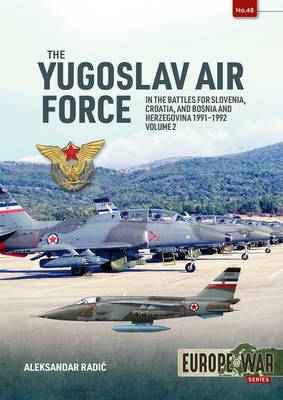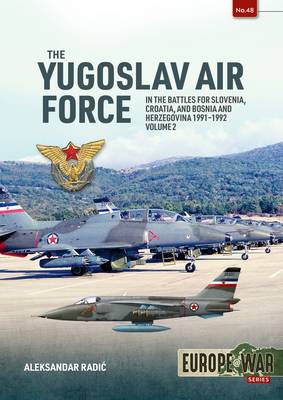
- Retrait gratuit dans votre magasin Club
- 7.000.000 titres dans notre catalogue
- Payer en toute sécurité
- Toujours un magasin près de chez vous
- Retrait gratuit dans votre magasin Club
- 7.000.0000 titres dans notre catalogue
- Payer en toute sécurité
- Toujours un magasin près de chez vous
The Yugoslav Air Force in the Battles for Slovenia Croatia and Bosnia & Herzegovina 1991-1992
Volume 2 - Jrvipvo in the Yugoslav War, 1991-1992
Aleksander Radic
27,95 €
+ 55 points
Description
Offers the first in-depth account of the Yugoslav Air Force's role in the Balkan wars of the 1990s, from Slovenia to Bosnia.
In 1991, the long-brewing political crisis in Yugoslavia boiled over into armed confrontation. The first conflict, fought in Slovenia, was over in a matter of weeks. A second confrontation, that with Croatia, would be a much longer and bigger affair in which the Yugoslav Air Force would play a major role in supporting the Serb-dominated Federal forces.
The troubles in Croatia had begun much earlier, and Serbian nationalism had stirred unrest long before Croatia sought independence. In late 1990, Croatian Serbs from a cluster of Serb-majority municipalities self-proclaimed their independence and began consolidating their control over more than a third of Croatia. In turn, keen to secede from the Socialist Federal Republic of Yugoslavia, the new government in Zagreb was left with no choice but to start organising its own armed forces.
On 14 September 1991, Croatia launched an offensive against the Yugoslav National Army (JNA) bases on its soil, resulting in the capture of many barracks and arms depots and the blockading of others. The result was that the Croats captured sufficient weaponry that they could face off against the Federal and Serbian forces on almost equal footing.
In turn, the JNA launched its own full-blown strategic offensive with multiple operations across Croatia, aiming to defeat the latter's nascent armed forces and capture Zagreb. Against this background, the Yugoslav Air Force and Air Defence (RV i PVO) found itself initially flying operations in support of JNA 'peacekeepers', before having to conduct months of combat operations in support of ground forces all over Croatia.
Richly illustrated with original photographs - most in colour - and specially commissioned colour illustrations, Volume 2 of The Yugoslav Air Force In the Battles for Slovenia, Croatia, and Bosnia and Herzegovina, 1991-1992 provides a detailed examination of the RV i PVO's operations over northern and eastern Croatia through the autumn of 1991.
In 1991, the long-brewing political crisis in Yugoslavia boiled over into armed confrontation. The first conflict, fought in Slovenia, was over in a matter of weeks. A second confrontation, that with Croatia, would be a much longer and bigger affair in which the Yugoslav Air Force would play a major role in supporting the Serb-dominated Federal forces.
The troubles in Croatia had begun much earlier, and Serbian nationalism had stirred unrest long before Croatia sought independence. In late 1990, Croatian Serbs from a cluster of Serb-majority municipalities self-proclaimed their independence and began consolidating their control over more than a third of Croatia. In turn, keen to secede from the Socialist Federal Republic of Yugoslavia, the new government in Zagreb was left with no choice but to start organising its own armed forces.
On 14 September 1991, Croatia launched an offensive against the Yugoslav National Army (JNA) bases on its soil, resulting in the capture of many barracks and arms depots and the blockading of others. The result was that the Croats captured sufficient weaponry that they could face off against the Federal and Serbian forces on almost equal footing.
In turn, the JNA launched its own full-blown strategic offensive with multiple operations across Croatia, aiming to defeat the latter's nascent armed forces and capture Zagreb. Against this background, the Yugoslav Air Force and Air Defence (RV i PVO) found itself initially flying operations in support of JNA 'peacekeepers', before having to conduct months of combat operations in support of ground forces all over Croatia.
Richly illustrated with original photographs - most in colour - and specially commissioned colour illustrations, Volume 2 of The Yugoslav Air Force In the Battles for Slovenia, Croatia, and Bosnia and Herzegovina, 1991-1992 provides a detailed examination of the RV i PVO's operations over northern and eastern Croatia through the autumn of 1991.
Spécifications
Parties prenantes
- Auteur(s) :
- Editeur:
Contenu
- Nombre de pages :
- 78
- Langue:
- Anglais
- Collection :
Caractéristiques
- EAN:
- 9781914059179
- Date de parution :
- 30-06-25
- Format:
- Livre broché
- Format numérique:
- Trade paperback (VS)
- Dimensions :
- 203 mm x 292 mm
- Poids :
- 320 g

Les avis
Nous publions uniquement les avis qui respectent les conditions requises. Consultez nos conditions pour les avis.






